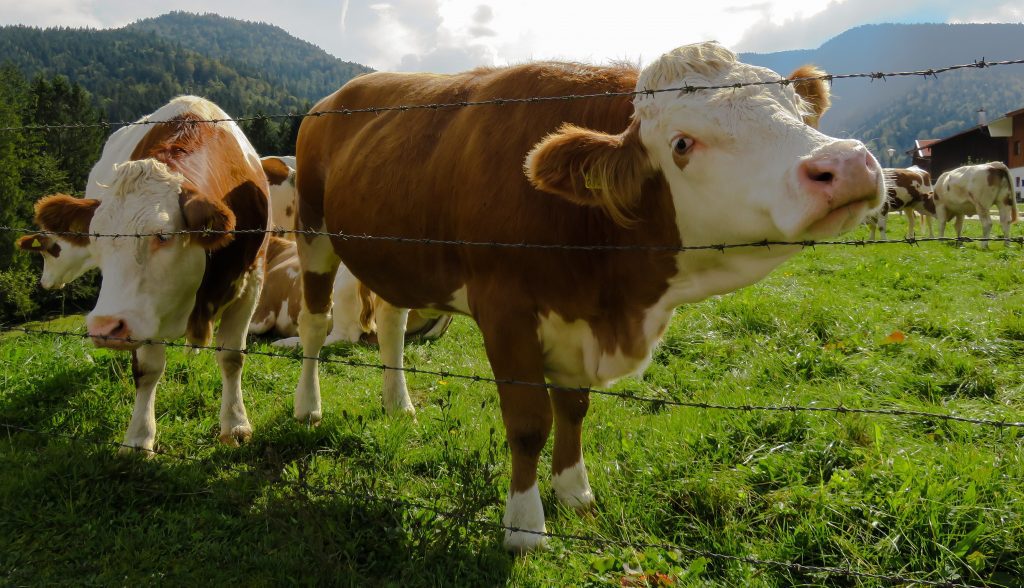By SWNS staff
New York office - 646-873-7565 / usnews@swns.com
The carbon impact of dairy butter can be more than three-and-a-half times that of its plant-based equivalents, according to a new report - with methane-producing dairy cows partly to blame.
Food production is one of the top triggers of global climate change, with the food sector responsible for up to 30% of greenhouse gases.
In a large-scale study investigating the environmental impact of animal-derived products compared to their plant-based options, scientists carried out a Life Cycle Assessment (LCA) on a breakfast staple - margarine.
The study evaluated 212 plant-based spreads and margarines sold across 21 markets in North America and Europe and compared the greenhouse gas emissions in producing these to producing 21 dairy butters.
Scientists compared producing dairy butter with plant-based spreads. They found that on average the ‘mean average’ CO2 equivalent for plant-based spreads and margarines was 7.3lbs of CO2 produced for every 2.2lbs of margarine produced - compared to a 26.7lb of CO2 equivalent for dairy-based products, an increase of more than 3.5 times.
In the production of raw milk - the key ingredient in dairy butter - 38% of the greenhouse gases come from enteric emissions, (in other words the methane caused by cows burping and breaking wind). In fact, just one 8.8oz pack of dairy butter result in the equivalent of 2.2 pounds of cow emissions (2.2lb CO2 eq).
And while carbon dioxide usually gets the bad rap, methane is about 80 times more powerful at trapping heat than CO2, making it responsible for 25% of global warming.
The 212 plant-based spreads and margarines analyzed by scientists ranged from 2.16 to 15.3lb CO2-equivalent of methane for every 2.2lb produced, as compared to 17.8 to 37.3lb CO2 equivalent of methane for every 2.2lb of the 21 butter products.
Contrary to arguments about the environmental benefits of locally sourced meat and dairy due to the emissions caused by transportation, the study revealed that when comparing the full life cycle of a margarine or plant-based spread with dairy butter, margarines and plant-based spreads consistently had a significantly lower climate impact. Cattle feed production and livestock rearing - including dairy cow-related methane and manure management - contributed significantly to climate change impacts, with a higher impact than most other factors.
Packaging for plant-based spreads makes up 8% of its emissions compared to 1% for butter, with the latter often wrapped in a lightweight foil or paper parchment compared to a tub.
The life cycle assessment, which is the largest of its type to-date, concluded that and plant-based spreads and margarines have a lower impact than dairy butter in terms of climate, water and land usage.
The International Journal of Life Cycle Assessment was written by a group of scientists based on a study of Upfield’s margarines and spreads.
It covered the full life cycle of the products, including production stages such as crop cultivation, oil extraction and refinement, transportation of oils, production of all other ingredients, blending of final products, packaging, distribution, refrigeration at retail and at the consumer’s home and end-of-life treatment of packaging.
Across these factors, the total environmental impact was measured, with metrics including climate change impact, water use and land use.
For dairy butter-based products, the study analyzed factors including feed production, dairy farming, processing raw milk into butter and cream, packaging, distribution, refrigeration at retail and at the consumer’s home and packaging end-of-life treatment.
The life cycle assessment of Upfield’s margarines and spreads is in line with growing scrutiny around the environmental impact of the foods we eat – especially meat and dairy – and shifting of consumer attitudes towards more plant-based foods.
Sally Smith, Head of Sustainability at Upfield, said: “In order to achieve emissions targets designed to limit global warming to 1.5°C by 2050, there needs to be a fundamental transformation of our food system. In Western countries especially, we currently rely too heavily on meat and dairy.
It is our responsibility as a forward-thinking company to understand and act to address the impact of our plant-based products on the environment. A shift to regenerative agricultural practices will be key for both crop and dairy farmers. Robust lifecycle assessments help ensure that our approach is data-driven and grounded on the latest scientific evidence.
As our products generally have a significantly lower carbon footprint, use less water and less land, we have an opportunity to help people understand the impact that food choices have on the environment and therefore help them to make a more informed choice that is better for the planet.”
The report follows separate research by Dr. Hannah Ritchie, from the University of Oxford, who concluded the 'eating local' mantra was a 'misguided piece of advice' when discussing climate change.
Her study found transport emissions are often a very small percentage of food’s total emissions – only 6% globally.
For more information on the LCA, please visit: https://upfield.com/environmental-footprint/
